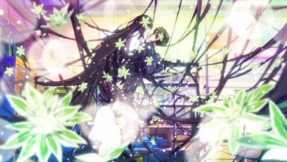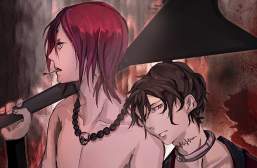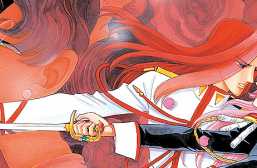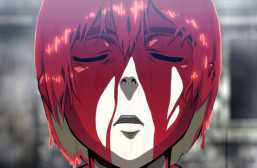Hyouka (2012) Review: A Stylish Mystery that Breaks the Norms

Brought to viewers by the staff of Kyoto Animation—famous for providing “in-your-face” dramas (Clannad, Kanon, Air), and cute high school girls doing cute high school things (Lucky Star, K-On!)—, one would not expect something so … subtle and complex. Part of the reason for this may be the fact that the show is originally based off of Honobu Yonezawa’s series of “Classic Literature Club” novels, as opposed to following the popular trend of adapting from light novels. Since the former is a medium that places emphasis on prose, instead of illustrations as in the case of the latter, it lends the author greater capability to delve into his characters’ psyche. And in a show that is as character-driven as Hyouka, the novel’s structure of story-telling is apparent.
While Hyouka is certainly influenced by its predecessors—featuring a cute high school girl as one of its leads, and drama being embedded as an element throughout—at no point do they overshadow the show’s primary purpose: to present viewers with a slew of well-rounded, nuanced characters; to entertain through the genre of mystery/suspense, and some light comedy; and to carve its identity into the foundation stone of anime as unique to itself.
From the very beginning, the show makes it a point to say that it will not conform to the expected standards of generic high school anime. Yes, the show is primarily set around the activities of an after-school club; yes, there is a school culture festival; and yes, there is an episode where the characters go to a hot springs. However, when all of these things do happen, first of all, whole episodes are not devoted, nor do they rely on these events in order to create “interest.” And secondly, when these tropes are employed, they serve more as a familiar “hello” to the average high school anime before plunging into the “meat” of the show.
Hyouka is in the mystery genre, and as such, it uses these familiar settings in order to set up its stories. By this I mean, not only is there a new, peculiar mystery to be solved each time, but viewers are given more and more insight into the main characters, their motivations, and their relationships to one another—hidden bits and pieces of the characters’ personalities are revealed, and prior events and twists, which viewers were not aware of, arise to wreak havoc on their perception of what they thought they had previously understood. Hyouka is thus a show that actively reciprocates its audience’s feelings and thoughts, constantly keeping them guessing in a playful manner, and at times, in an unexpectedly dark way as well.
Since I could not find a trailer for the show, below is an English subbed opening theme sequence for it:
Story and the World it Takes Place in
The first character we are introduced to is Oreki Houtarou—a lazy guy who prefers an unconventional “gray” life as opposed to the stereotypical “rose-colored” one of his fellow peers. After receiving a request from his sister to join the Classics Club, lest it be shut down, Oreki travels to the clubroom and discovers a girl, Chitanda Eru, standing at the window and looking out over the schoolyard (Note: despite this set-up, the show is not a romance). She tells him that she joined the Classics Club, and Oreki, no longer feeling obligated to stay in it, prepares to leave.
However, when he tells her to lock up when she is finished, she claims she does not have a key, nor was the door locked when she had entered the room—immediately peculiar since Oreki had to unlock the door in order to enter the room in the first place. As a result, Chitanda’s insatiable curiosity awakens, she clasps Oreki’s hand in both of hers, pushes against him, and with her hypnotic-like eyes, convinces him to help her investigate how she ended up locked inside the room. And thus begins the first, albeit brief and simple, mystery. There are a total of 3 major mystery arcs, in addition to several episodic ones. While the mysteries that occur during the major arcs are very well developed, the mysteries that occur over the course of a single episode are not always difficult for the audience to figure out—in fact, at times the answers are dead obvious.
However, the purpose of such episodes seems more to introduce certain sides of the characters, that the viewers were previously unaware of, than to create a puzzling story.

For example, in an episode where Chitanda suddenly finds herself yelling at her teacher, the audience is meant to be more intrigued with what could have motivated a previously depicted sweet, kind-hearted character to act in such a way, rather than focus on the reason behind how the teacher misconstrued which lesson he had last left the class with. One can argue that the decision to diminish the complexity of the mystery of such episodes is a fault of the show, but considering that the anime only runs for 22 episodes, it is very possible that the staff was going for more than just a typical short-run mystery series. The choice to gradually shape the presentation of its characters into realistic, 3-dimensional people seems more of a plus than a minus, even at the expense of minor mysteries.
The pacing, however, may be the deal-breaker. If you’re looking for a mystery show where a crazed murderer is chopping up bodies left and right, or a show that is filled with heart-pumping action every minute, or anything else that falls in the same extravagant category, then steer clear of this one. Hyouka basks in the seemingly mundane and firmly devotes itself to the common. Combine this with the fact that the characters thoughtfully turn over every minute detail of a new mystery, and you have anything but a “thriller.”
From this perspective, the show is breaking the norms of notable detective suspense thrillers like Death Note. In Hyouka, we don’t have a single character who is able to immediately unravel a highly complex and incomprehensible mystery in a matter of seconds; we have 4 main characters, each of whom contributes something meaningful to a discussion, while one of them, after the course of several episodes, manages to combine all the little bits of information into a coherent image.
So yes, we do have a brilliant investigator, but not only is the depiction more realistic, but the various supporting characters are not useless as well. Again, the pacing may be something that can deter many viewers, but if you’re a fan of the Sherlock Holmes stories, and you’re looking for a realistic, down-to-earth mystery show, then you’ll enjoy Hyouka a great deal.
Characters and their Development
Within the first two episodes, all 4 of the main characters are introduced: Oreki Houtarou—the very intelligent, but lazy, male lead of the series; Chitanda Eru—the kind-hearted, persistently curious, distinguished female lead; Fukube Satoshi—the carefree, fake “man of the world” and close friend of Oreki’s; and Ibara Mayaka—the sensitive, irritable, manga-lover girl. Upon first impression, viewers are most likely to feel they have seized up just exactly who each of these characters are. However, as the show progresses, the characters’ idiosyncrasies become more apparent, their pasts and the things that are most meaningful to them are revealed in a natural, uncontrived manner, and even the sides of themselves that they are far less proud of rise to the surface as well.

Perhaps even this may not impress the veteran anime-watchers because learning a new side to a character is a common feature of all animes. Hyouka, on the other hand, is a show that consistently brings up new and different information about each character, making it difficult to pin them down as any particular “type” (the most notable to mention, in terms of his development, perhaps being Fukube). Even the characters themselves are often surprised, not only with some of the choices the others make, but with some of the choices they make themselves. The method of “showing” and not “telling” is also an impressive feature of the show, for, while there are brief instances when characters’ thoughts are narrated, the writers of the show don’t belabor the descriptions of characters’ emotions to the point where it becomes tedious, or employ “deep” metaphors for the sake of creating a “dramatic effect.”
Each character brings to the table their own unique emotional baggage, and while their feelings do occasionally slip out from behind their attempts at stoicism, direct conflict where characters are soap-operatically yelling and venting their thoughts to one another never occur.
The only issue which some viewers may have is the enigmatic nature of Chitanda Eru. Part of the reason for this is because we are constantly viewing her from Oreki’s perspective—a character who often thinks he has Chitanda all figured out, but who constantly finds himself surprised the more he discovers about her. On the one hand, it makes Chitanda an interesting character to observe, but on the other hand, viewers may feel that she is ironically a “characterless character,” and point to it as a fault of the show. Such an opinion is difficult to comment on objectively, so I will leave viewers to decide for themselves.
Aesthetics and Conclusion

In terms of the overall look and feel of Hyouka, it is absolutely gorgeous. The animation is perfect in subtly revealing characters’ thoughts and feelings on matters through body language, even when they seem to be completely neutral in their words. Backgrounds, while having a darker, brooding look to them at times, can turn refreshingly vibrant, warm, and colorful at unexpected moments. And the soundtrack always lends the proper tone, if not amplifies a pre-existing one several times over, generally involving orchestral music, piano, or a light band instrument to reinforce the warm “classics” feel of the Classics Club, or an eerie, creeping feel when they begin to delve into mysteries. However, the most notable feature to mention may be the director’s infusion of surrealism with the ordinary. It happens in practically every episode and is often used to suggest something about a particular character (either Chitanda or Oreki), or the atmosphere of the mystery being investigated.
For veteran anime watchers: It is definitely worth checking out; if not for the story, then at least for the style itself as it is very unique. You will discover a show that is very different from your typical run-of-the-mill high school anime, and if you’re a fan of thoughtful, realistic suspense stories, then it will be a solid viewing experience.
For non-anime watchers: This show may be a difficult one to tackle especially since it requires so much of the viewer’s attention. I would suggest watching a few animes belonging to similar genres before trying this one out. Death Note is a great place to start in terms of a detective/suspense show, despite how much of a polar opposite it is from Hyouka, and a couple short high school animes to familiarize with certain tropes would help as well.
Rating:
What do you think? Leave a comment.











I enjoyed hyouka, but the thing hyouka was really missing was the lack of romance between oreki and chitanda when they definitely had the potential for a great romance plot as well
There was potential, but that was not the point of the show–in fact, I would argue that the decision to deny a romance, as you see occur multiple times, was purposefully done. Hyouka is meant to deviate from the typical tropes of high school anime, as I discuss in my review in some detail. If you were looking for a romance, then Hyouka was not the right choice. If you enjoy romances, the first season of Kimi ni Todoke is good, Toradora, kimikiss pure rouge, nagi no asukara, and plenty of others may have suited your viewing experience better. Thanks for the read!
I got the impression the romance between them was hiding underneath the surface. In episode 21 it definitely seems like Eru has a crush on Oreki but isn’t sure how to verbalise her feelings as she doesn’t completely understand them or knows what she wants.
I think Oreki is very interested in how Chitanda thinks but he doesn’t categorize it as love. Maybe he is trying to figure out what he thinks. It is made very clear that Oreki is attracted to her though
I don’t know how much of the books were adapted but it seems like a matter of Time 🙂
Romance “potential”??? In the last episode Oreki literally imagines asking Chitanda to marry him!! Sure, there’s never a confession, but the beauty of Hyouka is its subtlety. There doesn’t need to be a confession.
On the plus side, it is a nice change of pace.
The thing I did not like about the ending was that it left me wanting more after but know it was over.
You never know, they might do a couple OVAs or maybe even a film. A manga adaptation of it began in 2012 I believe, so if you’re looking for a more complete experience, then you might want to look into that. Thanks for the read!
good review, but when there is a mystery anime, i like it more when its more mature and violent like for example monster or psycho pass. teenagers helping the school finding who steals the materials from the clubs isn’t something interesting for me.
Both Monster and Psycho Pass are excellent examples of violent animes with more adult themes. Hyouka, as you mention, and as I’ve pointed out in my article, was not intended to be that kind of a show. It’s supposed to be ordinary, it’s supposed to stay within the bounds of realism, and it does those things in a very compelling and genuine manner if you are interested in animes that explore the common and the every-day. If you didn’t enjoy it, then it just wasn’t your kind of mystery show. Thanks for the read!
i keep waiting for this show to be licensed or brought over on dvd in some capacity… even if it a sub-only release, but I don’t know if that’s ever going to happen 🙁
🙁 you can’t find it online?
Yes I can, I just generally prefer to watch on DVD so I’m holding out. I guess its pointless XD
XP completely up to you; I have adblock on my computer and I watched it on dailymotion: nothing like great quality without the ads 😀
It’s common for viewers to want more romance between Chitanda and Oreki (and to an extent between Satoshi and Mayaka as well), but I think – as you correctly pointed out – the point of the show is subtlety, that if any such romance is clearly stated then it’ll go against what the show is trying to get at.
Thank you Justin 🙂 my thoughts exactly.
The very first five episodes was boring for me, i gave up for about a year plus but i decided to give it one more chance and all i can say is that after episode five it gets more interesting.
To each his own; thanks for the read!
one of my favorites because the main character is just great
glad to hear it 😀
thanks for the read!
I have been meaning to watch this show and this review may have been the nudge to finally get me to do it. Well done.
Thank you so much! Hope you enjoy it 🙂
Great review! I have been meaning to watch Hyouka for a great while right now, although I am not a big fan of most KyoAni shows in general (the only thing I have fully loved from them was The Disappearance of Haruhi Suzumiya), I do always like the animation.
Thank you! It’s definitely worth the watch 🙂 thanks for the read!
This is a very good review!
For me, Hyouka is a very good anime in terms of storytelling and character development (not to mention the animation’s top-notch).
The mystery is not meant to contend those found in Detective Conan or Death Note, but it’s a plot device meant to enhance the story.
Agreed 🙂 and thank you so much for your comment!
Excellent series, my fav show from KyoAni discluding Clannad
Thank you for your comment 🙂
Hyouka was very believable and interesting to sit through. There was plenty to love about this show and it’s story. It was a great ride, one that allowed me to enjoy a type of genre which I don’t normally do.
Glad to hear you enjoyed it so much 🙂 it’s one of my favorites as well.
A wonderfully narrated story, but which stopped in the last four episodes, which were just irrelevant fillers with fake plots and fake character development.
To each his own; I’m glad you enjoyed at least most of it 🙂
The music was my fav part.
One of the many outstanding features of the show 🙂 thanks for the read!
It got boring really fast when they try solving mystery that really no one could care about. It was like, Eru was someone I thought was adorable, then just wanted to slap her cause she finds the need to consently get into everyone’s business when she really has no place to be there.
More anime like this, please.
I can see why some viewers may see Chitanda Eru as a “characterless character” and we can make fun of her part in the story like with this video: https://www.youtube.com/watch?v=jSsSWd0Z4yY (Which I actually find really cute and funny). I found it interesting how you mentioned we only see her through Oreki’s eyes. How different the story would be from Chitanda’s point of view! To me, she is an essential character that contrasts with Oreki; She is the one that brings up most of the mysteries for Oreki to solve. Her character is one of childlike curiosity where she says what is on her mind.
Overall, Hyouka fit my story taste buds very well. I like how you mentioned that it shows rather than tells the story in many cases. I prefer stories with subtle ideas that make me think about my own life in different lights. Another favorite anime of mine is Natsume Yuujinchou (or “Natsume’s Book of Friends). It has a similar melancholy feeling that I adore.
Hyouka is a very fresh take in the mystery department in anime. It’s amazing how well the main characters are developed through the story and how well the story goes along that development; none of the actions shown through the story contradict any of the characters motives or ideologies, instead it evolves through them. In the animation Kyoto animation delivers spectacularly; fluid and dynamic scenes which never seem to keep still, Kamiyama High feels as alive as its characters and it can be felt how things actually progress in the background. It was an interesting ride in its entirety, even the subtle romance bits gave Hyouka a peculiar feel to it that you often can’t find in other stories or anime.
Loved Hyouka. Very character driven, great animation and subtle plot that always seemed deeper than it appeared. It took me a while to realize the mystery was more about the characters and what they thought about themselves and others, rather then the “problems” in school.
I also thought that while the last four eps were plot lacking, character development was fantastic and the ending was great and said a lot for what the show was really about.
If you find the show boring for its first couple eps, it is a little slow, but important building … But by ep 5 things really pick up.
Aaa, if you want to know Chitanda Eru point of view, you could read the novel volume 3. You might found out some truth you didn’t see in anime. Like
(Spoiler?)
She believe that she is not religious person, which I find interesting since the impression I get from the anime is so much different.
I really like this mystery series!